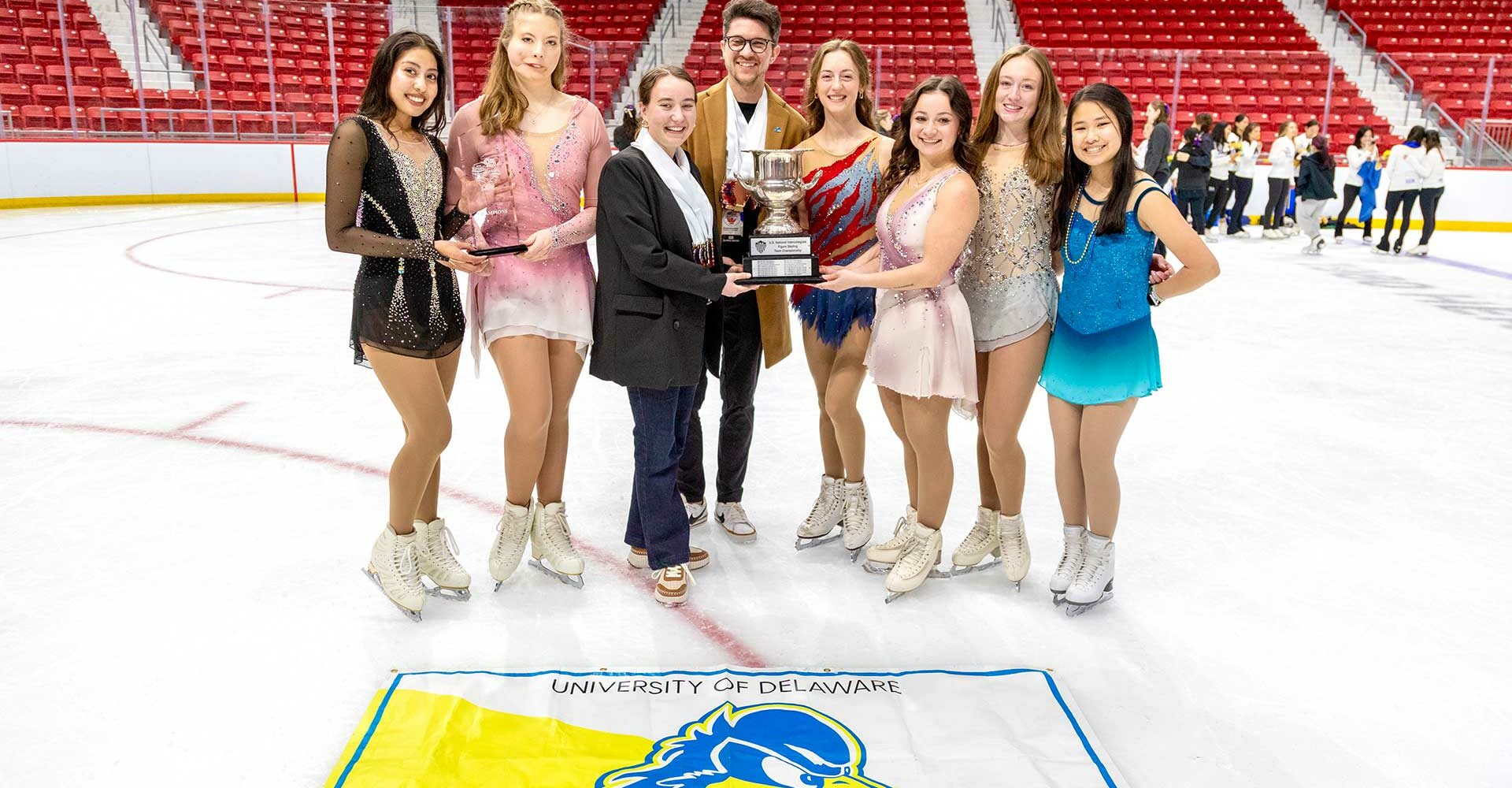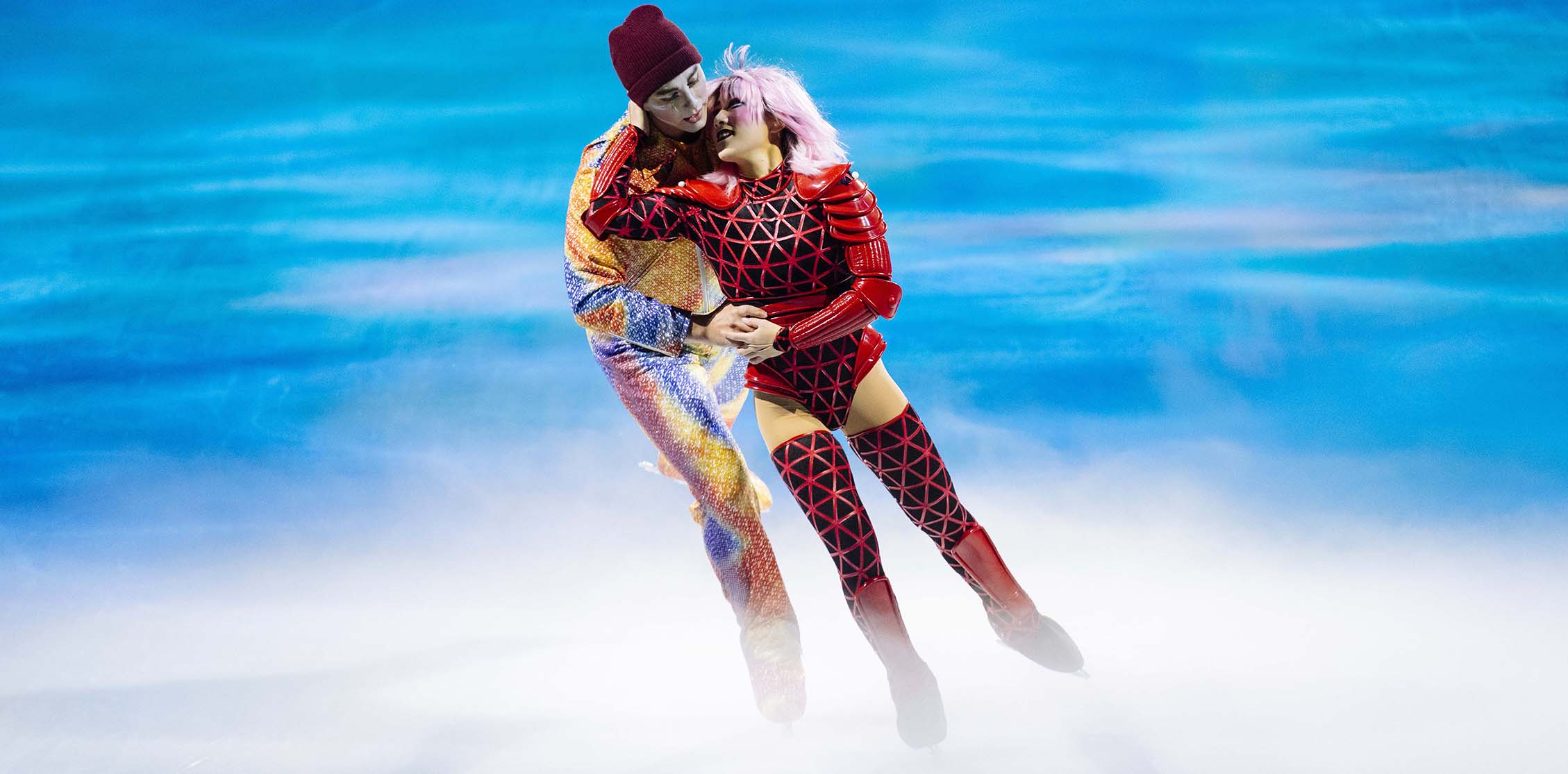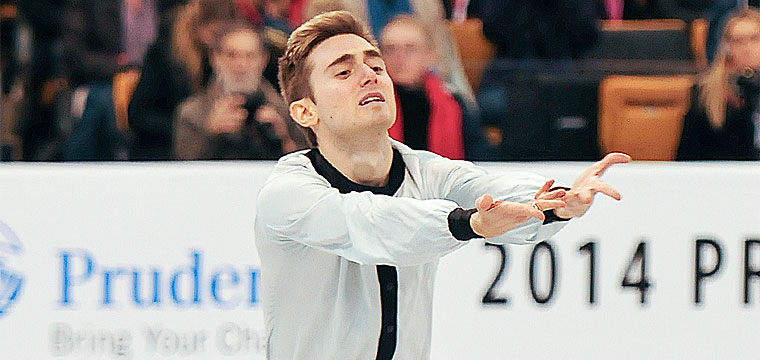By Maura Sullivan Hill, Team FSO Contributing Writer
Photos by Colin McManus/University of Delaware Figure Skating Team & Ice-Dance.com
Editor’s Note: This is our sixth, and last article for 2024 in a series of articles on skaters who are competing with their colleges or universities in U.S. Figure Skating’s Collegiate/Intercollegiate Skating. We will resume our series in spring 2025.
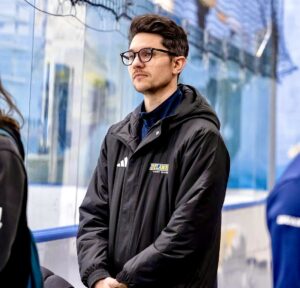 The University of Delaware (UD) collegiate skating team won their seventh national title at the 2024 Intercollegiate Final in April, which meant they got to hang a banner in their home rink on campus, the Fred Rust Ice Arena. These types of banners are found in ice rinks across the country, touting the facility’s champions and medal winners, and are always a point of pride.
The University of Delaware (UD) collegiate skating team won their seventh national title at the 2024 Intercollegiate Final in April, which meant they got to hang a banner in their home rink on campus, the Fred Rust Ice Arena. These types of banners are found in ice rinks across the country, touting the facility’s champions and medal winners, and are always a point of pride.
“To be able to get a banner in our rink again, one of the last banners that was put up was Stasia’s and mine, for medaling at the U.S. Championships,” said Colin McManus, assistant coach of the UD team and 2016 U.S. pewter medalist in ice dance with his partner Anastasia Cannuscio. “It felt really cool to earn another banner for the rink. To do it for myself and then do it as a coach was really cool.”
McManus’ road from competing as a Team USA ice dancer to collegiate skating wasn’t a typical one, since he never attended UD as a student or competed in college skating himself. But it was certainly a natural progression for a skater who spent his training days on campus at the University of Delaware.
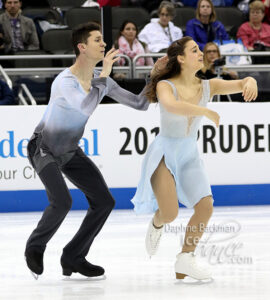 “I went full throttle into working on being an elite athlete and taking that chapter of my life very seriously, then I transitioned right into coaching and that took off, which is wonderful and a blessing, but I never really had that college experience,” said McManus, who hails from Saugus, MA, and competed internationally for Team USA from 2010-2017. “Being on a college campus at all times, it’s a really interesting window into the college experience, where it’s incredibly social. [Collegiate skating] is a really awesome way for people to come together and find friendship on campus, and to create a home base for yourself at a new rink with a lot of different people. Ice is ice and everyone comes with the same passion for skating.”
“I went full throttle into working on being an elite athlete and taking that chapter of my life very seriously, then I transitioned right into coaching and that took off, which is wonderful and a blessing, but I never really had that college experience,” said McManus, who hails from Saugus, MA, and competed internationally for Team USA from 2010-2017. “Being on a college campus at all times, it’s a really interesting window into the college experience, where it’s incredibly social. [Collegiate skating] is a really awesome way for people to come together and find friendship on campus, and to create a home base for yourself at a new rink with a lot of different people. Ice is ice and everyone comes with the same passion for skating.”
And that passion for skating is what McManus sees as the ultimate strength of the intercollegiate skating program in the U.S., as it grows in popularity and participation. It’s part of why he wanted to be involved with coaching the UD team, in addition to the other coaching he does.
“While elite skating was my life and Team USA was my life for many years, I think that the world of skating has so much more to offer. Being involved in U.S. Figure Skating, I don’t think that our programs get enough credit,” he said. “Our programs are the backbone of what U.S. Figure Skating is, and the elite is just a small percentage of the skaters out there. This intercollegiate program truly does justice for all levels, for all abilities, for all walks of life and skating. It’s so incredibly inclusive and accessible, and celebrates skating on all levels.”
At a typical collegiate competition, you’ll see high-level athletes competing in junior or senior events, like former Team USA pairs skater Audrey Lu skating in the senior women’s event or two-time Olympian and Olympic Team Gold Medalist Karen Chen competing in senior solo free dance. But you’ll also find skaters who pick up the sport in college and compete at their first competition. There are skaters competing in the introductory Aspire levels, or pattern dances of all levels. And each of these athletes has the opportunity to contribute to their team’s result — their final placement is assigned a point value, based on the event level and number of skaters in the group, and that amount goes towards their team’s final point tally.
“The purpose is, you’re doing this for your team. Your team is here to support you on your good days and your bad days, and your motivation may change,” McManus said. “It’s weird to take skating and turn it into a team sport when it’s been so individual, and that’s a really hard turnover for a lot of skaters, because I think they put so much pressure on themselves. But it’s for your team. You can walk out and have your medal, but you just awarded those points to your team and that’s a wonderful thing. The mentality is a little bit different.”
This different approach has proven to be energizing for McManus.
“It’s reinvigorated my passion for skating,” he said. “Because I find that I look at things completely differently with an intercollegiate lens. It’s really amazing to look at every single skater, regardless of their level, and they still have the same value to a team, regardless of if you’re doing a triple salchow or you’re doing a single.”
 That holistic approach paid off for the UD team this past season, when they won their record-tying seventh national title in Lake Placid in April 2024. Only Delaware and Boston University have won that many national titles at the collegiate level, and BU set that record in 2023. Just a year later, the Delaware Blue Hens tied it, earning the national title back for the first time since 2016 and after five consecutive silver medal finishes.
That holistic approach paid off for the UD team this past season, when they won their record-tying seventh national title in Lake Placid in April 2024. Only Delaware and Boston University have won that many national titles at the collegiate level, and BU set that record in 2023. Just a year later, the Delaware Blue Hens tied it, earning the national title back for the first time since 2016 and after five consecutive silver medal finishes.
“There was this long drought, this curse that we were trying to reverse, and everything just felt right,” said McManus, who assists head coach Leah Krauskopf, his former ice dance student. “With the competition being in Lake Placid, it felt very serendipitous, just because Lake Placid has such an ice dance tie. We go to Lake Placid every summer. So Leah and I had a really good feeling about Lake Placid. We were like, ‘The dance gods are on our side.’”
With two ice dancers at the helm of the UD team, it’s a definite strength of the program, even though their athletes compete in both free skate and dance events.
 “We always say at Delaware, you came in a free skater, but you will leave a dancer,” McManus said with a chuckle. “A lot of kids come to college and maybe they don’t have the best relationship with skating; they just want to have fun or don’t want to jump again or don’t want to compete. And I’m like, well, just because you’re not jumping doesn’t mean you can’t compete. Why don’t we try putting together a free dance where you can skate and enjoy and have fun, and let’s see what happens. So it’s been a little bit more convincing and opening people’s minds to the possibility of reinventing themselves.”
“We always say at Delaware, you came in a free skater, but you will leave a dancer,” McManus said with a chuckle. “A lot of kids come to college and maybe they don’t have the best relationship with skating; they just want to have fun or don’t want to jump again or don’t want to compete. And I’m like, well, just because you’re not jumping doesn’t mean you can’t compete. Why don’t we try putting together a free dance where you can skate and enjoy and have fun, and let’s see what happens. So it’s been a little bit more convincing and opening people’s minds to the possibility of reinventing themselves.”
The UD team, which boasts 50 skaters, has a team practice at 6:30 am every Thursday, where both McManus and Krauskopf coach the skaters. The rest of the week, the student-athletes practice on their own during the regular UD freestyle sessions, often booking private lessons with their team coaches or other facility coaches. In addition to their competition season, the team also hosts a fundraising ice show performance.
When McManus isn’t coaching the UD skaters, he is busy with choreography work and coaching his students at the Diamond Ice Dance Academy, where he works alongside his partner Cannuscio and Suzy Semanick-Schurman. Their group also practices at the Rust Ice Arena, and they have two partner dance teams and a large stable of solo dancers, who recently won seven medals at the U.S. National Solo Dance Final in September.
“The academy is diamond for Delaware being the diamond state, and diamond quality. We want all of our students to shine brightly. It just felt like a good metaphor,” McManus said. “And diamonds are tough, so tough kids.”
Off the ice, McManus has a two-year-old son with his wife, Bella, who is a fellow former Team USA ice dancer, his skating partner’s sister, and the skating director at the UD rink.
The work McManus does with collegiate skaters, both as the UD assistant coach and in private lessons with the student-athletes, is an important component of his overall coaching work, where he emphasizes balance with all the athletes he teaches.
“Schooling in general is always so important, and the balance of life is so important, when it comes to skating. I think we need to be enriched in all aspects of our lives,” he said. “We need to have a lot of other things to be happy, healthy, well-rounded people, because skating is such a privilege, right? But it can’t be everything. So balance is always something that I try to teach.”
As an elite skater himself, McManus learned the importance of practice and preparation, and that’s also something he works to instill in his athletes.
“I always tell them [that] miracles don’t happen on the ice by chance, they happen because you’re prepared,” McManus said. “Especially leading into the intercollegiate final, I was on top of everybody like, there is no reason we can’t go into this event as the most prepared team. The most prepared skater will prevail, and that was our thought process. And that has been my thought process for all of my teaching. I tell that to every single one of my kids, if they’re going out to test, compete, whatever it is. Because you win now and you perform later. All the work goes in beforehand.”
McManus started working with the UD team during the 2020-2021 academic year, so the seniors who won the 2024 collegiate title were freshmen when he came on board.
“Just to see the growth in them from when I started coaching to when they finished up last year and graduated, and what they had done and how their skating had changed, just within the four years of doing intercollegiate, it was really cool and also very emotional,” McManus said. “I’m not an incredibly emotional person, but those freshmen becoming seniors and then graduating, that hit a little different.”
Read about other Team USA skaters involved in intercollegiate skating in our series:
From the Olympics to College Skating: What Keeps Karen Chen on the Ice
Medals and Med School: Joonsoo Kim
Wren Warne-Jacobsen’s Art of Balance
Former Team USA pairs skater Audrey Lu embraces collegiate skating


